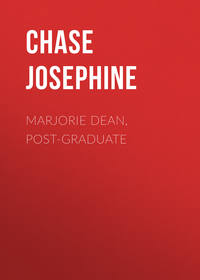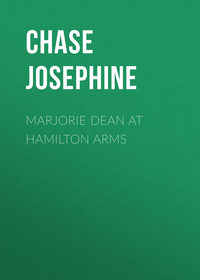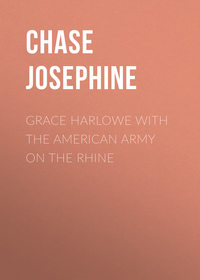 полная версия
полная версияMarjorie Dean, High School Sophomore
But while Mary Raymond was making a desperate attempt to redeem herself by at least one kind act, Mignon La Salle had reached the theatre. Dropping all appearance of haste, she strolled past the groups of gaily attired boys and girls, nodding condescendingly to this one and that, and switched downstairs to the dressing room which she occupied with several other girls. Leisurely removing her cloak, she plumed herself before the mirror. Her black eyes constantly sought her watch, however. At last she turned from the mirror with a peculiar smile and abruptly left the room. Straight to the star's dressing room she walked. Her thin fingers beat a sharp tattoo on the door. It opened, and she stood face to face with Constance Stevens, who was just about to take her place in the wings, preparatory to the beginning of the opera. She was to make her first entrance directly after the opening chorus.
"I came to tell you, Miss Stevens," said Mignon with an indescribable smile of pure malice, "that I saw your brother, Charlie, wandering along the street as I drove to the theatre. I suppose he has run away."
With a frightened cry, Constance dashed past her and up the stairs. Mignon laughed aloud as she watched the vanishing figure. "That settles her," she muttered. "Harriet Delaney can sing my part. She has understudied it." Springing into sudden action she ran to her dressing room, eluding a collision with the feminine portion of the chorus who were scurrying for the stage in obedience to a gong that summoned them to the wings. Reaching to a hook in the wall, from which depended her several costumes, hung over one another, she took from under them an almost exact copy of the gown Constance Stevens was wearing in the first act and held it up with a murmur of satisfaction. Stripping off the gown she wore she hastily donned this other costume. Then she sat down to await what she believed would happen.
But while Mignon busied herself with her own affairs, Constance was making a hurried search for Laurie Armitage. Unluckily, he had gone, for the moment, to the front of the house. Professor Harmon, too, was not in sight. He also had gone to the front to take his place in the orchestra pit. What could she do? The performance was about to begin. To leave the theatre on a search for Charlie meant disaster to Laurie's operetta. To leave Charlie to wander about the streets alone was even more terrifying. She flitted past the waiting choristers, drawn up for action, without a word of explanation. Marjorie Dean caught one look at her friend's terrified face. It was enough to convince her that something unusual had happened. Slipping out of her place in the line she followed Constance, who was making directly for the stage door. Marjorie saw her fling it open and glance wildly into the night. She ran toward Connie, calling out, "What is the matter?"
As the question crossed her lips both girls saw a familiar girlish figure, strangely burdened, running toward them as fast as the weight she carried would permit her to run. With a cry which rang in Marjorie's ears for days afterwards Constance darted forward. She wrapped the girl and her burden in a tumultuous embrace, laughing and crying in the same breath.
"The cross girl got Charlie, then she runned away and Mary comed and found him. Charlie's goin' to the the'tre to play in the band. Mary said so." He wriggled from the tangle of encircling arms to the stone walk. "Hello, Marj'ry," he greeted genially.
Marjorie turned from the marvelous sight of the two she loved best in each other's arms. It was too wonderful for belief. Tardy remembrance caused her to utter a dismayed, "You'll be late, Connie! Hurry in. Mary and I will take care of Charlie. It doesn't matter if I do miss the opening number."
With a swift glance at Mary that contained untold gratitude, Constance faltered, "I – love – you – Mary, for taking care of Charlie! I'll see you again as soon as I can. Good-bye!"
She was gone in a flash, leaving Mary and Marjorie to face each other with full hearts.
"You are my own, dear Mary again." Marjorie's clear voice was husky with emotion, "and my very first and best chum, forever!"
Mary nodded dumbly, her blue eyes overflowing. "I've – come – back – to – you – to stay," she whispered. And on the stone steps, worn by the passing of the feet of those who had entered the theatre to play many parts, these two young players in Life's varied drama enacted a little scene of love and forgiveness that was entirely their own.
CHAPTER XXVII
THE FULFILLMENT
The chorus were tunefully lifting up their voices in their initial number, their watchful eyes on Professor Harmon's baton, when the belated Princess hurried to her position in the wings. Laurie Armitage had returned to the stage and was instituting a wild search for Constance. Failing to find her upstairs, he had hastened below, and was rushing desperately up and down the corridors, peering into the open doorways of the deserted dressing rooms. Only one door was closed. Behind it a black-haired girl awaited a call to fame. He called Constance by name, again and again, then, receiving no answer, he dashed up the stairs, encountering the object of his search at the very height of his alarm. Marjorie Dean stood on guard beside her. She advanced toward the excited composer, saying briefly, "Let her alone, Laurie. She's awfully nervous and upset. She has just had a dreadful fright. I'll tell you about it later."
Constance cast a reassuring glance at Laurie. She had heard Marjorie's protecting words. "I'm all right now," she nodded. "I won't fail you."
The dulcet notes of her opening song, "I'm tired of being a Princess," brought immeasurable relief to Lawrence and Marjorie, as they stood in the wings, their anxious gaze fixed upon Constance. In one of the dressing rooms below, the silver strains came faintly to the ears of Mignon La Salle. During her interval of waiting she had been softly humming that very song, confident of the summons she believed she would receive. She had no doubt that her cowardly plan had worked only too well. Knowing Constance Stevens' deep affection for her tiny foster brother, she could readily see a vision of the terrified girl rushing out into the night in search of him, her duty to the operetta completely forgotten. As the sound of that hated voice reached her, she sprang to the door of her dressing room and half opening it, halted to listen. A wave of black rage swept over her. Forgetting her recent change of costume, she took the stairs, two at a time, and ran squarely against Lawrence Armitage and Marjorie Dean.
Marjorie could not resist a low laugh of contemptuous scorn as she viewed the stormy-eyed girl whose unscrupulous plan had failed. The contempt in her pretty face deepened as her quick eyes took in the details of Mignon's costume. The French girl's indiscreet haste to make ready had convicted her. Marjorie had already learned from Mary all that had occurred. It needed this one proof to complete the evidence. Lawrence Armitage was regarding Mignon with perplexed brow. "That is not the costume you wore last night, Miss La Salle," he said with cold abruptness. Scrutinizing her closely, amazement began to dawn on his clear-cut features. "When did you – "
With a low cry of mingled humiliation and fury, Mignon turned and ran down the stairs, her slender body trembling with the anger of a defeat born of the failure of her plan and her own betraying haste. Gaining the shelter of her dressing room, she gave herself up to a paroxysm of rage that ended in a burst of hysterical sobs.
The end of the first act brought a troop of hurrying, laughing girls downstairs. Instead of the alert, self-possessed Mignon who had swept proudly into the dressing room that night, those who shared the room with her found a convulsive weeper lying face downward on the floor.
"What's the matter?" was the concerted cry.
A good-natured senior took Mignon gently by the shoulders. "Get up, Mignon," she commanded. "If you don't stop crying, you won't be able to go on when your cue comes, let alone trying to sing." Mignon's first entrance took place in the second act and occurred directly after the rise of the curtain.
The French girl half raised herself at this reminder, then sank back to her original position with a fresh burst of racking sobs. Finding her good-natured ministrations ineffectual, the senior left Mignon to herself and began to change methodically to her peasant costume of the second act, the scene of which was laid in a village and in front of the cottage where she supposedly dwelt.
"Ten minutes," called the warning tones of the freshman who was serving as call boy. Still Mignon refused to heed the admonitions of her companions.
"Better call Laurie Armitage," suggested one girl. "She can't possibly go on. Harriet Delaney will have to take her place. Mignon isn't even dressed for her part. Where do you suppose – " The senior did not finish her sentence. Something in the familiar details of the gown Mignon wore aroused an unpleasant suspicion in her active brain. A swift-footed messenger had already sped away to find the young composer, who, with the departure of Ronald Atwell had taken the arduous duties of stage manager upon his capable shoulders.
When the information of Mignon's collapse reached him, he made no move to go to her. Instead, he beckoned to Harriet Delaney, who had just come upstairs, and whispered a few words to her which caused her colorful face to pale, then turn pinker than usual.
"But I haven't a suitable costume," several girls heard her protest.
"Go on as you are. Your costume is suitable," reassured Laurie.
But down in the dressing room Mignon had struggled to her feet. The knowledge that her unfairness was to cost her her own part in the operetta aroused her to action. In feverish haste she began to tear off the gown she wore.
"Second act," rang out through the corridor. With a low wail of genuine grief, Mignon dropped into a chair. She heard Harriet Delaney begin her first song. Unable to bear the chagrin that was hers, she sprang up. Readjusting the gown she had partly thrown off, she seized her cloak and wrapped it about her. Then she fled up the stairway, and into the calm, starlit night to where her runabout awaited her, the victim of her own wrong-doing.
It was a happy trio of girls that, shortly before midnight, climbed into the Deans' automobile, in which Mr. and Mrs. Dean sat patiently awaiting their exit from the stage door. Lawrence Armitage's operetta had been an artistic as well as a financial success. It had been a "Standing Room Only" audience, and the proceeds were to be given to the Sanford Hospital for Children. Laurie had decreed this as a quiet memento to Constance's devotion to little Charlie during his days of infirmity. The audience had not been chary of their applause. The principals had received numerous curtain calls, Constance had received an enthusiastic ovation, and many beautiful floral tokens from her admiring friends. Laurie had been assailed with cries of "Composer! Speech! Speech!" and had been obliged to respond. Even the chorus came in for its share of approbation, and to her intense amazement Marjorie Dean received two immense bouquets of roses, a fitting tribute to her fresh, young beauty. One of them bore Hal Macy's card, the other she afterward learned was the joint contribution of a number of her school friends.
Only one person left the theatre that night who did not share in the enthusiasm of the Sanford folks over the creditable work of their town boys and girls. Mignon La Salle's father had, for once, put business aside and come out to hear his daughter sing. Why she had not appeared on the stage, he could not guess. His first thought was that she had told him an untruth, but the printed programme carried her name as a principal. He arrived home to be greeted with the servant's assertions that Miss La Salle was ill and had retired. Going to her room to inquire into the nature of her sudden illness, he was refused admittance, and shrewdly deciding that his daughter had been worsted in a schoolgirl's dispute in which she appeared always to be engaged, he left her to herself. It was not until long afterward, when came the inevitable day of reckoning, which was to make Mignon over, that he learned the true story of that particular night.
It had been arranged beforehand that Constance was to spend the night with Marjorie. Shortly after Charlie had been comfortably established in Constance's dressing room, Uncle John Roland had appeared at the stage door of the theatre, his placid face filled with genuine alarm. He had been left in charge of Charlie, and the child had eluded his somewhat lax guardianship and run away. Finding the little violin missing, he guessed that the boy had made his usual attempt to find the theatre, and the old man had hastened directly there. Charlie was sent home with him, despite his wailing plea to remain, thus leaving Constance free to carry out her original plan.
The Deans exchanged significant smiles at sight of Marjorie, Mary and Constance approaching the automobile, three abreast, arms firmly linked.
"Attention!" called Mr. Dean. "Salute your officers!" Two hands went up in instant obedience of the order. Constance hesitated, then followed suit.
"I see my regiment has increased," remarked Mr. Dean, as he sprang out to assist the three into the car.
"Yes, Connie has joined the company," rejoiced Marjorie. "I am answering for her. She needs military discipline."
"Three soldiers are ever so much more interesting than two," put in Mary shyly. Her earnest eyes sought the face of her Captain, as though to ask mute pardon for her errors. Mrs. Dean's affectionate smile carried with it the absolution Mary craved, and Mr. Dean's firm clasp of her hand, as he helped her into the car, was equally reassuring.
Mrs. Dean had ordered a light repast especially on account of Constance and Marjorie. She had not counted on Mary, but she was a most welcome addition. Their faithful maid, Delia, had insisted on staying up to make cocoa and serve the supper party.
"Captain," begged Marjorie, as the three girls appeared in her room, after going upstairs, "please let us stay up as late as we wish to-night? We simply must talk things out. To-morrow is Saturday, you know."
"For once I will withdraw all objections. You may stay up as late as you please." The three girls kissed her in turn. Mary was last. Mrs. Dean drew her close and kissed her twice. "Have you won the fight, Lieutenant?" she whispered.
Mary simply nodded, her blue eyes misty. She could not trust herself to speak. "To-morrow – I'll – tell you," she faltered, then hurried to overtake Constance and Marjorie, who were half-way upstairs.
The "talk" lasted until two o'clock that morning. It was interspersed with laughter, fond embracing and a few tears. When it ended, Marjorie's dream of friendship had come true.
Mary had more to say than the others. She confessed to writing the letter of warning that had so mystified the basket-ball team.
"I knew you wrote it," Marjorie said quietly. "I found it out by comparing the paper it was written on with a letter I had received from you. I was so glad. I knew you couldn't be like Mignon, even if you were her friend."
"I was never her friend, nor she mine," asserted Mary with a positive shake of her head. "I was jealous of Constance and was glad to find someone besides myself who didn't like her. I never knew the true story of the pin until Jerry – " She paused, coloring deeply.
"So Jerry told you. That is just like her. She is the kindest-hearted girl in the world. Next to you two, I like her best of all my schoolmates." Marjorie's affectionate tones bespoke her deep regard for the stout girl whose matter-of-fact ways and funny sayings were a perpetual joy.
"If only I had listened to you and Connie in the first place." Mary sighed. "I've spoiled my sophomore year and tried hard enough to spoil yours. And there's so little of it left! I won't have time to show you how sorry I am and how much I care."
"We will begin now and make the most of what is left of it," proposed Marjorie gently. Then she added, "Jerry didn't know all that happened last year. I would like to tell you about it."
"Please do," urged Mary humbly.
Marjorie told the story of her first year in Sanford, frequently turning to Constance for confirmation. When she had finished Mary was silent. She had no words with which to express her utter contrition.
"Now you know our sad history," smiled Marjorie, with a kindly attempt at lightening the burden of self-reproach Mary bore.
"But neither of you has told me how Mary happened to find Charlie to-night," reminded Constance. "I am anxious to know. This is the first time he ever ran so far away."
"Oh, no, you forget the night he went to Mignon's – " Mary broke off shortly, red with embarrassment. She had not intended to speak of this. Constance's positive assertion had caught her off her guard.
"Went to Mignon's?" was the questioning chorus of her two listeners.
Mary was obliged to enlighten them. "I wondered if he ever told you, Connie. He promised he wouldn't," she ended.
"And he never told, the little rascal," was Constance's quick reply. "No one except the maid knew it, and you may be sure she never said a word."
"It was that night I came to my senses." Mary smiled a trifle wistfully. "I saw myself as others saw me. You thought I was grieving over Mignon, Marjorie. But I wasn't. It was my own shortcomings that bothered me. Now I must tell you about to-night, and then you will know everything about me."
Constance received the account of Mignon's attempt to supplant her in the operetta with no trace of resentment. "I ought to be angry with her, but I can't. She has suffered more to-night than I would have if her plan had succeeded. Poor Mignon, I wonder if she will ever wake up?"
"That's hard to say. At any rate, she did some good, even if she didn't intend to," reminded Marjorie. "I'm going to try to keep my junior year in high school free of snarls. There is no use in mourning for the past. Let us set our faces to the future and be glad that we three are done with misunderstandings. Marjorie Dean, High School Junior, is going to be a better soldier than Marjorie Dean, High School Sophomore has ever been."
Both Constance Stevens and Mary Raymond smiled at this earnest resolve. In their hearts they felt that Marjorie Dean need make no vows. She stood already on the heights of loyalty and truth, steadfast and unassailable.
How fully Marjorie Dean carried out her resolve and what happened to her as a junior in Sanford High School will be told in "Marjorie Dean, High School Junior," a story which every friend of this delightful girl will surely welcome.
THE END








